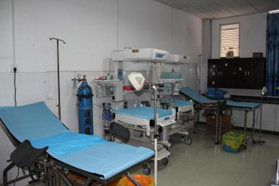Making childbirth safer helps China, U.S. CDC, and WHO reduce the threat of chronic hepatitis B virus and neonatal and maternal tetanus
This web page is archived for historical purposes and is no longer being updated.

"By integrating effective immunization practices with improved childbirth practices, China dramatically reduced the rate of chronic hepatitis B infection among young children while eliminating neonatal and maternal tetanus." - Mike O’Leary, WHO Representative, China
IN 2012 THE WORLD HEALTH ORGANIZATION recognized China for two major public health accomplishments. The nation exceeded the WHO Western Pacific Regional goal of reducing the prevalence of chronic hepatitis B virus infection among children less than five years of age and eliminated neonatal and maternal tetanus. These two accomplishments were part of China’s Safe Motherhood Initiative, which made the birthing process safer by bringing childbirth from the home into birthing centers and hospitals. This highly successful transition took many years. Tetanus, largely resulting from unhygienic umbilical cord care following delivery, was eliminated by centers set up for hygienic deliveries. As childbirth moved to centers and hospitals, tetanus disappeared.
AT THE SAME TIME, birthing centers were better equipped with lifesaving hepatitis B vaccine to be administered to newborn infants. The percentage of newborns receiving a timely dose of hepatitis B vaccine increased with the increase in center-based delivery and ultimately exceeded 95% of births. The use of hepatitis B vaccine was incorporated into China’s Expanded Program on Immunization in2002. As a result, the number of infants receiving three doses of hepatitis B vaccine has increased to more than 90%. The combination of the timely hepatitis B birth dose vaccine and high routine coverage with the vaccine led to chronic infection among young children being reduced from more than 8% in the prevaccine era to less than 1% now.
FOR STRATEGICAL REASONS, the long-term efforts to interrupt transmission of hepatitis B virus are focused on newborns and infants. Most transmission occurred during childbirth in China. Infection during infancy most often results in chronic hepatitis B – a likely life-long condition that perpetuates virus transmission. By attacking hepatitis B virus at its strongest but most vulnerable point, newborns are spared from being infected and spreading the infection, which will lead to a decline in rates of hepatitis B virus, liver cancer, and cirrhosis of the liver.
THESE DIRECT AND INDIRECT EFFECTS WILL RESONATE THROUGHOUT CHINA and the rest of the world. The accomplishments represent decades of work by China as well as long-term support by U.S. CDC, the WHO Western Pacific Regional Office and the Global Alliance for Vaccines and Immunization.